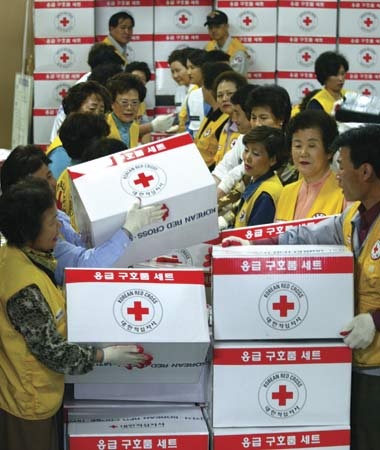nongovernmental organization
voluntary group of individuals or organizations, usually not affiliated with any government, that is formed to provide services or to advocate a public policy. Although some NGOs are for-profit corporations, the vast majority are nonprofit organizations. Some NGOs, particularly those based in authoritarian countries, may be created or controlled by governments. By most definitions, political parties and criminal or violent guerrilla organizations are not considered NGOs. The issues addressed by NGOs run the gamut of human concerns (e.g., human rights, environmental protection, disaster relief, and development assistance), and the scope of their activities may be local, national, or international. Some NGOs fulfill quasi-governmental functions for ethnic groups that lack a state of their own. NGOs may be financed by private donations, international organizations (international organization), governments, or a combination of these.
 NGOs have existed for centuries; indeed, in 1910 some 130 international groups organized a coordinating body called the Union of International Associations. The term nongovernmental organization was coined at about the time of the founding of the United Nations (UN) in 1945 to distinguish private organizations from intergovernmental organizations (IGOs), such as the UN itself. Many large international NGOs, such as Amnesty International, the International Federation of Red Cross and Red Crescent Societies, Oxfam International, CARE, Save the Children, and the World Wildlife Fund (WWF), are transnational federations of national groups. Other international NGOs, such as Greenpeace and the Sierra Club, are mass-membership organizations. Most NGOs are small, grassroots organizations not formally affiliated with any international body, though they may receive some international funding for local programs.
NGOs have existed for centuries; indeed, in 1910 some 130 international groups organized a coordinating body called the Union of International Associations. The term nongovernmental organization was coined at about the time of the founding of the United Nations (UN) in 1945 to distinguish private organizations from intergovernmental organizations (IGOs), such as the UN itself. Many large international NGOs, such as Amnesty International, the International Federation of Red Cross and Red Crescent Societies, Oxfam International, CARE, Save the Children, and the World Wildlife Fund (WWF), are transnational federations of national groups. Other international NGOs, such as Greenpeace and the Sierra Club, are mass-membership organizations. Most NGOs are small, grassroots organizations not formally affiliated with any international body, though they may receive some international funding for local programs. NGOs perform a variety of functions. They provide information and technical expertise to governments and international organizations (such as specialized agencies of the UN) on various international issues, often supplying local information unavailable to governments. NGOs may advocate on behalf of specific policies, such as debt relief or the banning of landmines (e.g., the International Campaign to Ban Landmines), and they may provide humanitarian relief and development assistance (e.g., the Red Cross, Oxfam, and CARE). NGOs may also monitor human rights or the implementation of environmental regulations (e.g., the International Union for the Conservation of Nature, Amnesty International, Human Rights Watch, and Transparency International).
NGOs perform a variety of functions. They provide information and technical expertise to governments and international organizations (such as specialized agencies of the UN) on various international issues, often supplying local information unavailable to governments. NGOs may advocate on behalf of specific policies, such as debt relief or the banning of landmines (e.g., the International Campaign to Ban Landmines), and they may provide humanitarian relief and development assistance (e.g., the Red Cross, Oxfam, and CARE). NGOs may also monitor human rights or the implementation of environmental regulations (e.g., the International Union for the Conservation of Nature, Amnesty International, Human Rights Watch, and Transparency International). Since World War II—and particularly since the 1970s—NGOs have proliferated, especially at the national and local levels. At the international level, large numbers of NGOs have been created to address issues such as human rights, women's rights, and environmental protection. At the same time, international NGOs have become important actors in world affairs within the UN and its specialized agencies and within other forums. A variety of factors have contributed to the growth of NGOs, including globalization (globalization, cultural); the increasing prominence of transnational issues such as those just mentioned; the growth in UN-sponsored global conferences, which often include parallel NGO forums; the communications revolution, which has linked individuals and groups through facsimile (fax), the Internet, and e-mail; and the spread of democracy, which has bolstered civil society and enabled individuals to form and operate organizations more freely. By the early 21st century, there were some 6,000 recognized international NGOs.
Since World War II—and particularly since the 1970s—NGOs have proliferated, especially at the national and local levels. At the international level, large numbers of NGOs have been created to address issues such as human rights, women's rights, and environmental protection. At the same time, international NGOs have become important actors in world affairs within the UN and its specialized agencies and within other forums. A variety of factors have contributed to the growth of NGOs, including globalization (globalization, cultural); the increasing prominence of transnational issues such as those just mentioned; the growth in UN-sponsored global conferences, which often include parallel NGO forums; the communications revolution, which has linked individuals and groups through facsimile (fax), the Internet, and e-mail; and the spread of democracy, which has bolstered civil society and enabled individuals to form and operate organizations more freely. By the early 21st century, there were some 6,000 recognized international NGOs.Although NGOs vary considerably in size, organization, and approach, they share the basic belief that principled individuals working together can do much to solve human and environmental problems through grassroots organizing, the creative use of information, and sophisticated political strategies. NGOs have played central roles in global campaigns against slavery, the trade in ivory, whaling, violence against women, apartheid in South Africa, and the proliferation of nuclear weapons.
NGOs exert influence on the policies and programs of governments and IGOs by observing or participating in the meetings at which norms, principles, treaties, and conventions are negotiated, disputes settled, and resources allocated. Although the UN's members are states, Article 71 of the UN Charter authorizes the Economic and Social Council (ECOSOC) to grant consultative status to NGOs. In the early 21st century, more than 2,000 NGOs were officially accredited with consultative status. Accredited NGOs are automatically granted the right to participate in UN-sponsored conferences, though each conference has different rules for the participation of other NGOs, particularly local ones. Beyond the UN, other IGOs set their own guidelines for NGO participation.
NGOs are influential because of their expertise and their access to important sources of information. As a result, a significant share of development aid and humanitarian relief is now channeled through such organizations. In some cases, however, the sheer number of NGOs as well as their diversity make it difficult for them to develop a coordinated approach to certain problems. Another factor that tends to limit their effectiveness is their perceived lack of representativeness. Many international NGOs, for example, claim to speak for the peoples of Africa, Asia, or Latin America, though their leadership is drawn almost exclusively from Europe or North America.
Since the late 20th century, some governments have reacted to the growing power and influence of NGOs by accusing them of being undemocratic and accountable only to those who provide them with funding. Other governments have attempted to prevent certain NGOs from participating in international decision-making forums. Despite these difficulties, NGOs continue to play an important role in developing global norms and rules on a wide range of transnational issues.
Nobel Prize winners by category (peace)The Nobel Prize for Peace has been awarded to several NGOs, including the International Committee of the Red Cross (1917, 1944, and 1963), Amnesty International (1977), International Physicians for the Prevention of Nuclear War (1985), the International Campaign to Ban Landmines (1997), and the Intergovernmental Panel on Climate Change (2007). For a full list of recipients of the Nobel Prize for Peace, see table (Nobel Prize winners by category (peace)).
Additional Reading
General discussions of nongovernmental organizations include Margaret E. Keck and Kathryn Sikkink, Activists Beyond Borders: Advocacy Networks in International Politics (1998); Ann M. Florini (ed.), The Third Force: The Rise of Transnational Civil Society (2000); and Robert O'Brien et al., Contesting Global Governance: Multilateral Economic Institutions and Global Social Movements (2000). The role of NGOs in the United Nations system is explored in Thomas G. Weiss and Leon Gordenker (eds.), NGOs, the UN, and Global Governance (1996); and Peter Willetts (ed.), The ‘Conscience of the World': The Influence of Non-Governmental Organisations in the UN System (1996). A historical study of NGOs is Steve Charnovitz, “Two Centuries of Participation: NGOs and International Governance,” in Michigan Journal of International Law, 18(2):183–286 (Winter 1997). The influence of NGOs in environmental politics is discussed in Paul Wapner, Environmental Activism and World Civil Politics (1996). An extended study of NGOs in the field of human rights is William Korey, NGOs and the Universal Declaration of Human Rights (1998, reissued 2001).
- globe amaranth
- Globe and Mail, The
- globeflower
- Globe Theatre
- globular cluster
- globulin
- glockenspiel
- Gloeocapsa
- Glomar Challenger
- Glomma
- Gloria Macapagal Arroyo
- Gloria Naylor
- Gloria Steinem
- Gloria Swanson
- Gloriosa
- Glorious Revolution
- glory-bower
- glossematics
- glossitis
- Glossopteris
- glottal stop
- glottis
- glottochronology
- Gloucester
- Gloucester, Gilbert de Clare, 8th Earl of, 9th Earl Of Clare